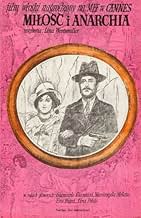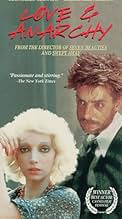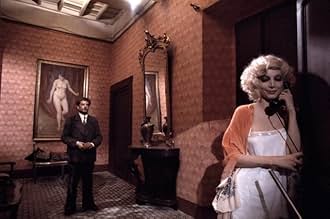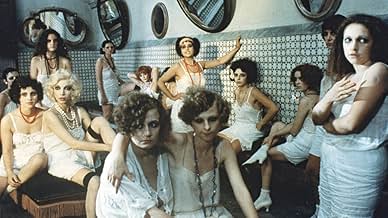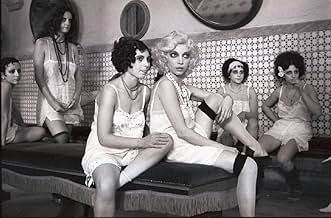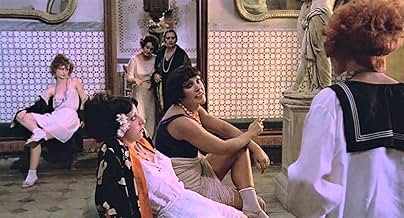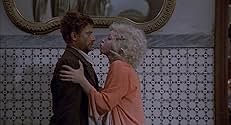Film d'amore e d'anarchia, ovvero 'stamattina alle 10 in via dei Fiori nella nota casa di tolleranza...'
IMDb रेटिंग
7.7/10
3.7 हज़ार
आपकी रेटिंग
अपनी भाषा में प्लॉट जोड़ेंWhen a friend is murdered by the Facists, a melancholy farmer takes up residence in a Roman brothel as he and an anarchist prostitute plot to assassinate Mussolini.When a friend is murdered by the Facists, a melancholy farmer takes up residence in a Roman brothel as he and an anarchist prostitute plot to assassinate Mussolini.When a friend is murdered by the Facists, a melancholy farmer takes up residence in a Roman brothel as he and an anarchist prostitute plot to assassinate Mussolini.
- पुरस्कार
- 4 जीत और कुल 3 नामांकन
फ़ीचर्ड समीक्षाएं
The well-regarded director Wertmuller made this movie which is a slow study into how brutality and violence can be saved my love in my opinion. It is very operatic which is how she chose to attack it. The direction, I can say is flawless but the movie feels incomplete. First, I am more the director who uses visual images rather than hammy stagey dialogue to tell their stories. Carnini is the only actor who does not use a pantomime, overexagerrated style in the movie until the very end, while everybody else does. It softens the impact of the movie as it is the quieter moments that carry real weight. The style of direction is very narchiac with wonderful wide shots and good editing creating an effigy of exuberance over the picture. Most of the picture set in an italian bordello where the fascists of italy stay is a place for both love between carnini and pesilamo. Images are beautiful, and certain individual scenes work while others don't. We are left with a great understanding of what love must feel like but the brutality of man is never explained. It esssentially sets up the theory that all fascists are naturally evil. The ending tells us it is the stoty of one man while the movie sets it up as the story of every man. This the best explanation I can give without speaking too much about its plot. Wertmuller was much better in Swept away and seven beauties. But for an introduction to Wertmuller, and arty Italian cinema of the sixties and seventies which dealt very operaticly with evils of fascism.
I saw this film two times in 1973 and a few years later again in art cinemas in the United States. I vividly remember the opening line, "I'm off to kill Mussolini. Screw the rest." While Fox Lorber put this film on DVD in 1997, it is now unavailable and sells for $37 used. I bought a made-in-China copy for $5 on Ebay. I was a bit upset when the first title read only "I'm off to kill Mussolini." I wondered why the change? Anyways the rest of the DVD seemed fine.
This is an amazing film. The acting by everyone is superb, with Giancarlo Gianini giving a performance that won him a best acting award at the Cannes film festival and should have won him an Oscar. He is Chaplinesque, but not imitative of Chaplin or anybody else. It is one of the most sympathetic performances ever given. In many scenes, he doesn't talk, but you sense his feelings of anger or sadness. His mass of freckles on his face make him look more like a 14 year old than a man planning a major political assassination. Mariangela Melato is sexy, foul-mouthed and hilarious. She also manages to make you believe that she is both a cynical prostitute and a politically and culturally aware anarchist. Lina Polito is the young prostitute with hope. She gives a performance similar to and as wonderful as Liza Minnelli in "Cabaret."
The musical score by Federico Fellini's main composer, Nino Rota, is energetic and terrific. It often counterpoints the action on the screen, bringing us away from it, and making some harsh scenes seem comical, but it also heightens the playfulness or menace in other crucial scenes. He won an Oscar for the Godfather Part II a few years later, but he deserved one here too.
This is a tribute to the European nihilist and anarchist movements of the 1800 and 1900's. It is also powerfully anti-fascist.
This is great and enthralling film-making. It is Lina Wertmuller's best film and still stands out today, nearly 40 years later, as a great historical and humanist work of art. It is sad that more people do not know about it and have not had the opportunity to experience it.
Having seen about 6,000 films (150 films X 40 years), I would put this one in the top twenty.
This is an amazing film. The acting by everyone is superb, with Giancarlo Gianini giving a performance that won him a best acting award at the Cannes film festival and should have won him an Oscar. He is Chaplinesque, but not imitative of Chaplin or anybody else. It is one of the most sympathetic performances ever given. In many scenes, he doesn't talk, but you sense his feelings of anger or sadness. His mass of freckles on his face make him look more like a 14 year old than a man planning a major political assassination. Mariangela Melato is sexy, foul-mouthed and hilarious. She also manages to make you believe that she is both a cynical prostitute and a politically and culturally aware anarchist. Lina Polito is the young prostitute with hope. She gives a performance similar to and as wonderful as Liza Minnelli in "Cabaret."
The musical score by Federico Fellini's main composer, Nino Rota, is energetic and terrific. It often counterpoints the action on the screen, bringing us away from it, and making some harsh scenes seem comical, but it also heightens the playfulness or menace in other crucial scenes. He won an Oscar for the Godfather Part II a few years later, but he deserved one here too.
This is a tribute to the European nihilist and anarchist movements of the 1800 and 1900's. It is also powerfully anti-fascist.
This is great and enthralling film-making. It is Lina Wertmuller's best film and still stands out today, nearly 40 years later, as a great historical and humanist work of art. It is sad that more people do not know about it and have not had the opportunity to experience it.
Having seen about 6,000 films (150 films X 40 years), I would put this one in the top twenty.
I saw this movie in the 1980s but it remains an all time favourite. It is a terrific story with a range of characters who demonstrate extremes of character. The women are sexy and smart and they are critical to the story. The music by Nino Rota is wonderful and delicately placed within the story. There are many memorable scenes. The stars Giancarlo Giannini, Mariangela Melato, and Lina Polito are perfect for their roles and there are many other notables including Eros Pagni who is the brute given charge of the black shirts. I've watched this film at least a dozen times and I plan to watch it many more before I return to the earth. I commend Love and Anarchy to you.
Directed by Lina Wertmüller in 1973, "Love & Anarchy" is an indisputable classic. Universally identifiable and immediately entertaining, Wertmüller carries her audience into the mind and times of Turin, a peasant in 1930s Italy. When one of his close friends and idols is killed by fascists, Turin becomes obsessed with anarchist ideals he hardly understands, and sets off to exact an awful vendetta--the assassination of Italian dictator Benito Mussolini. The plan gets off-track when Turin falls in love with Tripolina, a prostitute in the bordello where he lives in the days leading up to the assassination attempt. We soon learn that Tripolina returns his love, and the tragic stage is set. Knowing full well that the assassination attempt, successful or not, will surely mean his death, Turin is suddenly gripped by fear. When all he had at stake was a quiet life on the farm, he was glad to give it up for a chance at changing the quality of life for his peasant countrymen. But now, having tasted the happiness love can afford, can Turin really carry through with this suicidal act? Can he truly give up his life for a belief he once thought was worth dying?
"Love & Anarchy" is a brilliant study of turmoil and human testing in the face of insurmountable odds. It begs the question--is it better to bow and live, or stand up and die? How much can a people be crushed before someone makes a sacrifice for the betterment of society? Whose responsibility is it? And on a grander scale, is it better to live happily, contented by love or family, and leave the world untouched, or to attempt real change by sacrificing everything in exchange for it? "Love & Anarchy" poses all these questions, but it offers no easy answers.
Wertmüller's favorite actor, Giancarlo Giannini, plays the peasant boy, Turin, with beautiful humility. He wordlessly portrays infinite subtleties of emotion with body language and facial expression alone. Giannini has the face of a silent movie actor, and in fact was touted as a new Chaplin in the 1970s. Playing opposite him as the prostitute Salome is Mariangela Melato, who viewers may recognize from Wertmüller's "Swept Away." She, too, delivers a wonderful performance. The style and pacing of the film are excellent. Cinematographer Giuseppe Rotunno captures Rome in a gorgeous, yet unobtrusive manner.
In "Love & Anarchy," Wertmüller doesn't pull any punches. As par usual, she lets the politics of her movie decide the fate of its characters, and tragedy ensues. One must admire her for making an extraordinarily brave and beautiful film. She exhibits how powerful and effective a tragic story can truly be in exploring the more complex questions of life.
"Love & Anarchy" is a brilliant study of turmoil and human testing in the face of insurmountable odds. It begs the question--is it better to bow and live, or stand up and die? How much can a people be crushed before someone makes a sacrifice for the betterment of society? Whose responsibility is it? And on a grander scale, is it better to live happily, contented by love or family, and leave the world untouched, or to attempt real change by sacrificing everything in exchange for it? "Love & Anarchy" poses all these questions, but it offers no easy answers.
Wertmüller's favorite actor, Giancarlo Giannini, plays the peasant boy, Turin, with beautiful humility. He wordlessly portrays infinite subtleties of emotion with body language and facial expression alone. Giannini has the face of a silent movie actor, and in fact was touted as a new Chaplin in the 1970s. Playing opposite him as the prostitute Salome is Mariangela Melato, who viewers may recognize from Wertmüller's "Swept Away." She, too, delivers a wonderful performance. The style and pacing of the film are excellent. Cinematographer Giuseppe Rotunno captures Rome in a gorgeous, yet unobtrusive manner.
In "Love & Anarchy," Wertmüller doesn't pull any punches. As par usual, she lets the politics of her movie decide the fate of its characters, and tragedy ensues. One must admire her for making an extraordinarily brave and beautiful film. She exhibits how powerful and effective a tragic story can truly be in exploring the more complex questions of life.
Giannini is hilarious as a dim-witted hayseed anarchist, who, en route to assassinate Mussolini falls in love. An exuberant, vital, full throttle feast of a film, mostly set in a lusciously decadent Roman brothel, where Wertmuller, (who also wrote the very witty script) successfully directs the extraordinary (and excellently acted) characters through wild changes of mood, and juggles powerful politics, tender romance, horrible farce and tragedy with exceptional flair. Rotunno's photography is delicious; the unusually potent period atmosphere is splendidly captured by Enrico Job (Mr Wertmuller) and the music by Rota/Savina is perfect. Wertmuller at her most accessible.
क्या आपको पता है
- ट्रिवियाErrico Malatesta, who is quoted at the end of the film, was an Italian anarchist propagandist and revolutionary socialist. He edited several radical newspapers and spent much of his life exiled and imprisoned, having been jailed and expelled from Italy, England, France, and Switzerland. After World War I, he returned to Italy where his Umanità Nova, an anarchist newspaper, had some popularity before its closure under the rise of Mussolini. Malatesta was a committed revolutionary. He believed that the anarchist revolution was inevitable and that violence would be a necessary part of it since the state rested ultimately on violent coercion.
- क्रेज़ी क्रेडिटBefore end credits: "I wish to repeat my horror that attacks, which besides being bad in and of themselves are also stupid, because they harm the very cause they are trying to serve...But those assassins are also saints and heroes...And they will be celebrated once the brutal facts are forgotten, and all that is remembered is the idea that inspired them and the martyrdom that made them saints.--Errico Malatesta."
- इसके अलावा अन्य वर्जनFor the initial American release, editor Fima Noveck created a prologue which featured a montage of photos of Mussolini, along with a crawl explaining his rise to power and the violent activities sanctioned in his name during his reign.
- कनेक्शनFeatured in Dietro gli occhiali bianchi (2015)
टॉप पसंद
रेटिंग देने के लिए साइन-इन करें और वैयक्तिकृत सुझावों के लिए वॉचलिस्ट करें
- How long is Love & Anarchy?Alexa द्वारा संचालित
विवरण
- रिलीज़ की तारीख़
- कंट्री ऑफ़ ओरिजिन
- भाषा
- इस रूप में भी जाना जाता है
- Love & Anarchy
- फ़िल्माने की जगहें
- Parrocchia Santissima Annunziata, Piazza Reg. Margherita, 6, 04016 Sabaudia LT, इटली(Tunin cases the outside of the church)
- उत्पादन कंपनियां
- IMDbPro पर और कंपनी क्रेडिट देखें
बॉक्स ऑफ़िस
- दुनिया भर में सकल
- $965
- चलने की अवधि2 घंटे 4 मिनट
- ध्वनि मिश्रण
- पक्ष अनुपात
- 1.85 : 1
इस पेज में योगदान दें
किसी बदलाव का सुझाव दें या अनुपलब्ध कॉन्टेंट जोड़ें

टॉप गैप
By what name was Film d'amore e d'anarchia, ovvero 'stamattina alle 10 in via dei Fiori nella nota casa di tolleranza...' (1973) officially released in India in English?
जवाब

